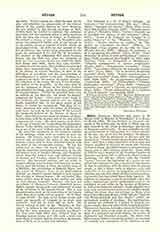

Huffer, HERMANN, historian and jurist; b. March 24, 1830, at Munster in Westphalia; d. at Bonn, March 15, 1905. Having finished his classical education in his native city, he went to Bonn and applied himself to the study of philology, the history of literature, and history. He was compelled to take up jurisprudence in consequence of a serious disease of the eye, but never lost his fondness for history. In the year 1853 he graduated at Breslau with the dissertation: “Justinianische Quasi-Pupilar-Substitution”, and, after a long educational tour in Italy and France, qualified as lecturer on canon and Prussian civil law at Bonn. In 1860 he became professor extraordinary, and in 1873 ordinary professor. From 1865 to 1870 he was a member of the Prussian Chamber of Deputies, and from 1867 to 1870 of the North German Reichstag, but did not affiliate with the Catholic “party” because the formation of a party on sectarian lines appeared to him a hazardous experiment. In fact in accordance with his ideal views he always sought to find a higher unity in religious, civil, and social life; in his opinion the important and decisive question was not that which divides parties, nations, and creeds, but that which binds them together. In addition to numerous essays in periodicals and a few rather unimportant juristic professional treatises, he published several works on the history of literature as well as on historical subjects—works planned on a large scale and elaborated subjects—works to the smallest detail. Among the former class his writings on Heine (Aus dem Leben Heinrich Heines, 1878) and on “Annette von Droste-Hiilshoff and ihre Werke” (1887) are particularly worthy of mention. His contributions to history are confined to a period of scarcely ten years, namely, the early years of the French Republic. They reveal, however, not only a wonderful knowledge of his subject from every point of view, but also the mind of a profound and acute scholar, the master of diplomatic and historical research. He threw new light on many hitherto unsolved problems, and created an entirely new conception of the relations of the two great German powers to the Revolution and to each other, and accordingly of the dissolution of the Holy Roman Empire of the German Nation. His principal work is entitled: “Diplomatische Verhandlungen aus der Zeit der franzosischen Revolution” in three volumes (1869-79), of which the first treats of the hostility of Austria and Prussia to the French Revolution down to the Treaty of Campo Formio, while the second and third deal with the Congress of Rastatt and the second coalition. Worthy of mention among his other works are “Der Krieg von 1799 and die 2. Koalition” (2 volumes, 1904) and “Quellen zur Geschichte des Zeitalters der franzosischen Revolution” (2 vols., 1900-).
PATRICIUB SCHLAGER

